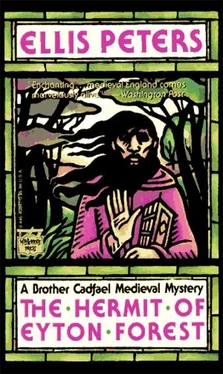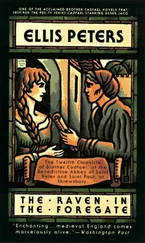“I do believe you,” said the abbot, abruptly releasing him from the scrutiny which had made him tremble. “I believe you are saying what you have been told, and what you believe to be true. But this is a more serious matter than you can understand, and it must be cleared up. A man against whom such an accusation has been made has the right to speak up for himself, and prove his good faith. I shall go myself, tomorrow early, and ask the hermit whether he is or is not a priest, and who ordained him, and where, and when. These things can be proven, and should be. You will surely have an equal interest, my lord, in finding out, once for all, whether this was indeed a marriage. Though I must warn you,” he added firmly, “that even if it is it can be annulled, seeing it cannot have been consummated.”
“Make the attempt,” retorted Astley, somewhat recovering his composure, “and it will be contested to the limit. But I acknowledge that truth must come out. We cannot have such doubts lingering.”
“Then will you not meet with me at the hermitage, as early as may be after Prime? It is fair we should both hear what Cuthred has to say. I am well sure,” he said with truth, having seen the effect of Richard’s outburst, “that you believed implicitly the man was a priest, with full rights to marry and bury. That is not in dispute. Richard has cause to hold to the contrary. Let us put it to the test.”
There was nothing Astley could object to in that, nor, thought Cadfael, had he any wish to avoid the issue. He had certainly been profoundly shocked by the suggestion of deceit, and wanted the damaging doubt removed. But he did make one more attempt to regain his hold meantime on the boy. He advanced a hand to Richard’s shoulder. “I will come to that meeting,” he said, “and see this deluded child proved wrong. But for this night I still hold he stands as my son, and should go with me.”
The hand closed on Richard’s arm, and the boy started and tore himself away. Brother Paul could no longer restrain himself, he hurried forward out of the staring ranks and drew the truant close to his side. “Richard stays here,” said Radulfus firmly. “His father entrusted him to me, and I set no limit on his stay with us. But whose son by law and whose husband the child is we must and will examine.”
Fulke was growing purple in the face again with suppressed anger. He had come so near to capturing the imp, and now to be thwarted, and the whole structure of his and Dionisia’s territorial plans put in jeopardy. He would not give up so easily.
“You take much upon yourself, my lord abbot,” he began, “in denying rights to his kin, you who have no blood claim upon him. And I think you are not without designs upon his lands and goods in keeping him here. You want no marriage for the boy, but rather to school him here until he knows no other world, and will enter tamely into his novitiate, and your house into his inheritance…” He was so intent on his accusations, and all those about him so stricken into wonder at his daring, that no one had yet observed the new arrival at the gatehouse. All eyes were on Astley, and all mouths agape in amazement, and Hugh had tethered his horse at the gate and entered on foot, making no noise. He had taken but ten paces into the court when his eye fell first on the grey horse and the black pony, crusted with the drying lather of their hasty ride, and held now by a groom, who stood gaping at the group framed in the archway of the cloister. Hugh followed the man’s fascinated stare, and took in at a glance the same arresting spectacle, the abbot and Fulke Astley face to face in obvious confrontation, and Brother Paul with an arm protectively about the shoulders of a small, wiry, grubby and dishevelled boy, who lifted to the evening light the wide-eyed face, half-frightened, half-defiant, of Richard Ludel. Radulfus, standing disdainfully silent under abuse, was the first to notice the new arrival on the scene. Looking clean over his adversary’s head, as with his height he could very well do, he said distinctly: “No doubt the lord sheriff will pay the attention due to your charges. As he may also be interested in how Richard came to be in your care at Leighton as late as last night. You should address your complaints to him.” Fulke span upon one heel so precipitately that he all but lost his balance; and there was Hugh coming briskly down the court to join them, one quirky eyebrow tilted into his black hair, and the eye beneath it bright and sharply knowing, and levelled upon Fulke. “Well, well, my lord!” said Hugh amiably. “I see you have made shift to discover and restore the truant I have just failed to find in your manor of Leighton. Here am I newly come from there to report failure to the lord abbot as Richard’s guardian, and here I find you have been doing my work for me while I was wild-goose chasing. I take that very kindly of you. I’ll bear it in mind when it comes to considering the little matter of abduction and forcible imprisonment. It seems the woodland bird that whispered in my ear Richard was at Leighton told simple truth, for all I found no trace of him when I put it to the proof, and no one to admit he’d ever been there. You can have been out of the house barely half an hour by some other path when I reached it by the road.” His observant eye roved over Richard’s taut figure and wary face, and came to rest on the abbot. “Do you find him in good heart, and none the worse for being caged, my lord? He’s come to no harm?”
“None to his body, certainly,” said Radulfus. “But there is another matter unresolved. It seems a form of marriage took place last night at Leighton between Richard and Sir Fulke’s daughter. To that Richard agrees, but he says that it was no real marriage, since the hermit Cuthred, who conducted it, is not a priest.”
“Do you tell me so?” Hugh pursed his lips in a soundless whistle, and swung round upon Fulke, who stood mute but watchful, all too aware of the need to step warily, and think now before he spoke. “And what do you say to that, my lord?”
“I say it is an absurd charge that will never stand. He came to us with the good will of the brothers of Buildwas. I never heard word against him, and do not believe it now. We have dealt with him in good faith.”
“That, I am sure, is true,” said the abbot fairly. “If there is anything in this charge, those who desired this marriage did not know of it.”
“But Richard, I think, did not desire it,” said Hugh, with a somewhat grim smile. “This cannot rest so, we must have out the truth.”
“So we are all agreed,” said Radulfus, “and Sir Fulke has contracted to meet with me tomorrow after Prime at the hermitage, and hear what the man himself has to say. I was about to send to you, my lord sheriff, and tell you how this thing stands, and ask you to ride with me tomorrow. This scene,” he said, casting an authoritative glance round at his all too attentive flock, “need not be prolonged, I think. If you will sup with me, Hugh, you shall hear all that has happened. Robert, have the brothers proceed. I am sorry our evening should have been so rudely disrupted. And, Paul…” He looked down at Richard, who had one fist tightly clenched on a fold of Paul’s habit, ready to hold fast had his tenure been threatened. “Take him away, Paul, clean him up, feed him, and bring him to me after supper. He has a great deal to tell us that has not been told yet. There, you may disperse, all, there is no more here to see.” The brothers edged aside obediently, and moved away somewhat raggedly to resume the interrupted order of the evening, though there would be furtive whispering even in the frater, and a great deal of excited talk afterwards in the leisured hour before Collations. Brother Paul marched his restored lamb away to be washed and made presentable before abbot and sheriff after supper. Aymer Bosiet, who had looked on with a certain malevolent satisfaction at someone else’s crisis and confusion as a relief from his own, detached himself moodily and went across the court to the guest hall. But Cadfael, suddenly moved to look back, missed the one figure he was seeking. Rafe of Coventry was no where to be seen, and now that Cadfael came to think of it, he must have taken himself off quietly some time before the intriguing scene ended. Because he had no interest in it, and was quite capable of detaching himself from a spectacle which held most men spellbound? Or because he had found something in it that interested him deeply and urgently?
Читать дальше












